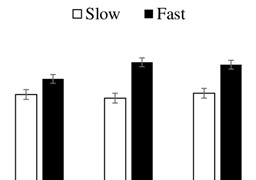[RH] мӢ лў°лҘј л–Ём–ҙлңЁлҰ¬лҠ” вҖҳмқ‘лӢө м§Җм—°вҖҷ
м Җл„җ мҳӨлёҢ нҚјмҠӨл„җлҹ¬нӢ° м•Ө мҶҢм…ң мӢёмқҙмҪңлЎңм§Җ(Journal of Personality and Social Psychology)м—җ л°ңн‘ңлҗң мғҲлЎңмҡҙ м—°кө¬м—җ л”°лҘҙл©ҙ, лҲ„кө°к°Җк°Җ м§Ҳл¬ём—җ лҢҖлӢөн•ҳкё° м „м—җ мһ мӢң л©Ҳм·„мқ„ л•Ң, к·ёкІғмқҙ лӢЁ лӘҮ мҙҲм—җ л¶Ҳкіјн•ҳлҚ”лқјлҸ„ к·ё лҢҖлӢөмқҖ мҰүмӢң лҢҖлӢөн–Ҳмқ„ л•ҢліҙлӢӨ м§„м •м„ұкіј мӢ лў°м„ұмқҙ л–Ём–ҙ진лӢӨкі мӮ¬лһҢл“Өмқҙ мқёмӢқн•ҳлҠ” кІғмңјлЎң лӮҳнғҖлӮ¬лӢӨ. мҰү, мқ‘лӢө м§Җм—°мқҖ м§„м •м„ұкіј мӢ лў°м„ұмқ„ к°җмҶҢмӢңнӮЁлӢӨ. к·ёлҰ¬кі лЁёлӯҮкұ°лҰҙмҲҳлЎқ м§„м •м„ұмқҙ к·ёл§ҢнҒј лҚ” л–Ём–ҙ진лӢӨкі мӮ¬лһҢл“ӨмқҖ л°ҳмқ‘н–ҲлӢӨ.
лӢӨлҘё мӮ¬лһҢл“Өмқҳ м§„м •м„ұмқ„ нҸүк°Җн•ҳлҠ” кІғмқҖ мӮ¬нҡҢм Ғ мғҒнҳёмһ‘мҡ© кіікіім—җм„ң л°ңмғқн•ҳкі н•ҙлӢ№ мҳҒм—ӯм—җм„ң л§Өмҡ° мӨ‘мҡ”н•ҳлӢӨ. кІ°лЎ м ҒмңјлЎң мқҙ м—°кө¬лҠ” мқ‘лӢө мҶҚлҸ„к°Җ мӮ¬лһҢл“Өмқҙ м§„м •м„ұмқ„ м¶”лЎ н•ҳлҠ” мӨ‘мҡ”н•ң лӢЁм„ңмһ„мқ„ ліҙм—¬мЈјкі мһҲлӢӨ.
мқҙ м—°кө¬лҠ” лҜёкөӯ, мҳҒкөӯ, н”„лһ‘мҠӨ м¶ңмӢ мқҳ 7,500лӘ… мқҙмғҒмқҳ к°ңмқёмқ„ лҢҖмғҒмңјлЎң н•ң мқјл Ёмқҳ мӢӨн—ҳмқ„ кё°л°ҳмңјлЎң н•ңлӢӨ. м°ёк°ҖмһҗлҠ” к°„лӢЁн•ң м§Ҳл¬ё, мҳҲлҘј л“Өм–ҙ, м№ңкө¬к°Җ л§Ңл“ мјҖмқҙнҒ¬к°Җ л§ҲмқҢм—җ л“Өм—ҲлҠ”м§Җ, м§ҒмһҘм—җм„ң лҸҲмқ„ нӣ”міӨлҠ”м§Җ л“ұм—җ мқ‘лӢөн•ҳлҠ” мӮ¬лһҢл“Өм—җ кҙҖн•ң мҳӨл””мҳӨ н•ң л¶Җ분мқ„ л“Јкұ°лӮҳ мҳҒмғҒмқ„ ліҙкұ°лӮҳ л¬ёмһҘмқ„ мқҪм—ҲлӢӨ. к°Ғ мӢңлӮҳлҰ¬мҳӨм—җм„ң мқ‘лӢө мӢңк°„мқҖ мҰүмӢңм—җм„ң 10мҙҲ м§Җм—°к№Ңм§Җ лӢӨм–‘н–ҲлӢӨ. мқҙнӣ„ м°ёк°Җмһҗл“ӨмқҖ мқ‘лӢөмқҳ м§„м •м„ұмқ„ мҠ¬лқјмқҙл”© мІҷлҸ„лЎң нҸүк°Җн–ҲлӢӨ.
14к°ңмқҳ лӘЁл“ мӢӨн—ҳм—җм„ң м°ёк°Җмһҗл“ӨмқҖ лӘЁл‘җ мқјкҙҖлҗҳкІҢ л°ҳмқ‘н–ҲлҠ”лҚ° мјҖмқҙнҒ¬мІҳлҹј к°ҖлІјмҡҙ м§Ҳл¬ёкіј лІ”мЈ„м—җ лҢҖн•ң мӢ¬к°Ғн•ң м§Ҳл¬ём—җ мғҒкҙҖм—Ҷмқҙ, мқ‘лӢөмқҙ м§Җм—°лҗң кІҪмҡ° к·ё мқ‘лӢөмқҖ лҚң м„ұмӢӨн•ң кІғ к°ҷлӢӨкі нҸүк°Җн•ң кІғмқҙлӢӨ.
м—°кө¬мһҗл“ӨмқҖ лӘҮ к°Җм§Җ мЎ°кұҙмқҙ мқҙ нҡЁкіјлҘј к°җмҶҢмӢңнӮЁлӢӨлҠ” мӮ¬мӢӨлҸ„ л°ңкІ¬н–ҲлӢӨ. мҳҲлҘј л“Өм–ҙ, м№ңкө¬к°Җ мһҗмӢ мқҙ л§Ңл“ мјҖмқҙнҒ¬лҘј мўӢм•„н•ҳлҠҗлғҗкі л¬јм—Ҳмқ„ л•Ң вҖңм•„лӢҲ, мӢ«м–ҙвҖқлқјкі л§җн•ҳлҠ” кІғмІҳлҹј мӮ¬нҡҢм ҒмңјлЎң к·ёлӢӨм§Җ л°”лһҢм§Ғн•ҳм§Җ м•ҠмқҖ лҢҖмқ‘мқҳ лҢҖлӢөмқҙлқјл©ҙ мқ‘лӢө мҶҚлҸ„лҠ” к·ёлӢӨм§Җ мӨ‘мҡ”н•ҳм§Җ м•ҠмқҖ кІғ к°ҷм•ҳлӢӨ. мқҙ кІҪмҡ° л№ лҘҙл“ лҠҗлҰ¬л“ к·ё лҢҖлӢөмқҖ м„ұмӢӨн•ҳлӢӨкі м—¬кІЁмЎҢлӢӨ. м—°кө¬мӣҗл“ӨмқҖ лҳҗн•ң мӮ¬лһҢл“Өмқҙ вҖҳлҠҗлҰ° л°ҳмқ‘мқҙ м–ҙл–Ө мғқк°Ғмқҳ к№ҠмқҙлҘј мҡ”н•ҳлҠ” кІғмқё кІҪмҡ°вҖҷ, мҳҲлҘј л“Өм–ҙ, 10л…„ м „м—җ мӮ¬нғ•мқ„ нӣ”міӨлӢӨл©ҙ кё°м–өмқ„ лҚ”듬м–ҙм•ј н•ҳлҠ” кІҪмҡ°, м§„м •м„ұм—җ мһҲм–ҙ л°ҳмқ‘ мҶҚлҸ„лҠ” к·ёлӢӨм§Җ мӨ‘мҡ”н•ҳм§Җ м•Ҡм•ҳлӢӨ.
мӮ¬лһҢл“ӨмқҖ мғҒнҳёмһ‘мҡ©мқ„ н• л•Ңл§ҲлӢӨ м„ңлЎңмқҳ м§„м •м„ұмқ„ нҢҗлӢЁн•ҳкё° л•Ңл¬ём—җ мқҙ м—°кө¬лҠ” л§Өмҡ° кҙ‘лІ”мң„н•ң к°–лҠ”лӢӨ. мқҙлҹ¬н•ң м§ҒмһҘ лӮҙ мһЎлӢҙм—җм„ң м»Өн”Ң л°Ҹ м№ңкө¬л“Өмқҳ л§җлӢӨнҲјм—җ мқҙлҘҙкё°к№Ңм§Җ кҙ‘лІ”мң„н•ң мғҒнҳёмһ‘мҡ©м—җ м Ғмҡ©лҗ мҲҳ мһҲкё° л•Ңл¬ёмқҙлӢӨ.
мӮ¬лһҢл“ӨмқҖ м·Ём—… л©ҙм ‘мқҙлӮҳ мІӯл¬ёнҡҢ, мһ¬нҢҗм—җм„ң 진мӢӨн•ң нҢҗлӢЁмқ„ лӮҙл Өм•ј н•ңлӢӨ. мқҙл•Ң мқ‘лӢө мҶҚлҸ„к°Җ мқјм • м •лҸ„мқҳ м—ӯн• мқ„ мҲҳн–үн• мҲҳ мһҲлӢӨ.
мҳҲлҘј л“Өм–ҙ, мұ„мҡ© кҙҖлҰ¬мһҗк°Җ м•Өкіј л°”лёҢлқјлҠ” л‘җ лӘ…мқҳ кө¬м§Ғ нӣ„ліҙм—җкІҢ к·ёл“Өмқҙ мЈјмһҘн•ң лҢҖлЎң н”„лЎңк·ёлһҳл°Қ м–ём–ҙ мһҗл°”мҠӨнҒ¬лҰҪнҠёлҘј м •л§җлЎң м•Ңкі мһҲлҠ”м§Җ 묻лҠ”лӢӨкі к°Җм •н•ҙліҙмһҗ. м•ӨмқҖ мҰүмӢң мҳҲлқјкі лҢҖлӢөн•ҳкі л°”лёҢлҠ” 3мҙҲ нӣ„м—җ мҳҲлқјкі лҢҖлӢөн–ҲлӢӨл©ҙ?
м—°кө¬ кІ°кіјлҠ” мқҙ мғҒнҷ©м—җм„ң мұ„мҡ© кҙҖлҰ¬мһҗк°Җ л°”лёҢліҙлӢӨлҠ” м•Өмқ„ лҜҝмқ„ к°ҖлҠҘм„ұмқҙ лҚ” лҶ’кё° л•Ңл¬ём—җ мқҙлҠ” м•Өмқҙ мөңмў… кі мҡ©лҗ к°ҖлҠҘм„ұмқҙ лҶ’лӢӨлҠ” кІғмқ„ мӢңмӮ¬н•ңлӢӨ. мқјл°ҳм ҒмңјлЎң н•„мҡ”н•ң лӢөліҖмқҙ мһҲмқ„ л•Ңл§ҲлӢӨ лӢөліҖмқҙ лҠҰм–ҙм§Җл©ҙ м§„м •м„ұмқҙ л–Ём–ҙм§ҖлҠ” кІғмңјлЎң мқёмӢқлҗ мҲҳ мһҲлӢӨлҠ” мқҳлҜёмқҙлӢӨ.
мқ‘лӢө мӢңк°„мқҙ мӨ‘мҡ”н• мҲҳ мһҲлҠ” лҳҗ лӢӨлҘё мҳҒм—ӯмқҖ лІ•м • мҰқм–ём—җ лҢҖн•ң л°°мӢ¬мӣҗмқҳ л°ҳмқ‘мқҙлӢӨ.
лӢЁмҲңнһҲ 집мӨ‘мқ„ лӘ»н•ҳкұ°лӮҳ, мӢ мӨ‘н•Ёкіј к°ҷмқҖ лӢӨлҘё мҡ”мқём—җ мқҳн•ҙ мқ‘лӢөмқҙ м§Җм—°лҗҳлҠ” кІҪмҡ°, к·ёлҰ¬кі к·ё мқ‘лӢөмһҗк°Җ мҡ©мқҳмһҗмқё кІҪмҡ° мқҙлҠ” л¶Ҳкіөм •н•ң кІ°кіјлҘј л°ңмғқмӢңнӮ¬ мҲҳ мһҲлӢӨ.
мқ‘лӢө м§Җм—°м—җ мӢ кІҪ м“°м§Җ л§җлқјлҠ” м§ҖмӢң мӮ¬н•ӯмқҙ лӢӨмҶҢ к·ёлҹ¬н•ң нҢҗлӢЁм—җ лҒјм№ҳлҠ” мҳҒн–Ҙмқ„ к°җмҶҢмӢңнӮӨкёҙ н–Ҳм§Җл§Ң, к·ё мҳҒн–Ҙмқ„ мҷ„м „нһҲ к°җмҶҢмӢңнӮӨм§ҖлҠ” лӘ»н–ҲлӢӨлҠ” кІғмқҙ м—°кө¬мқҳ мөңмў… кІ°кіјмҳҖлӢӨ. кІ°лЎ мқҖ, м „л°ҳм ҒмңјлЎң л№ лҘё мқ‘лӢөмқҙ лҚ” м§„м •м„ұмһҲлҠ” кІғмңјлЎң мқёмӢқлҗҳлҠ” л°ҳл©ҙ, лӘҮ мҙҲлқјлҸ„ м§Җм—°лҗҳлҠ” мқ‘лӢөмқҖ кұ°м§“л§җлЎң к°„мЈјлҗ к°ҖлҠҘм„ұмқҙ лҚ” лҶ’лӢӨлҠ” лҚ° мһҲлӢӨ.
Reference:
JOURNAL OF PERSONALITY AND SOCIAL PSYCHOLOGY. February 15, 2021, вҖңSlow Lies: Response Delays Promote Perceptions of Insincerity,вҖқ by Ignazio Ziano, et al.© 2021 National Library of Medicine. All rights reserved.
To view or purchase this article, please visit:
[RH] Slow Lies: Response Delays Promote Perceptions of Insincerity
According to new research published in the Journal of Personality and Social Psychology, when people pause before replying to a question, even for just a few seconds, their answers are perceived to be less sincere and credible than if they had replied immediately. And the longer the hesitation, the less sincere the response appears.
Evaluating other peopleвҖҷs sincerity is a ubiquitous and important part of social interactions. This research shows that response speed is an important cue on which people base their sincerity inferences.
The findings were based on a series of experiments involving more than 7,500 individuals from the United States, the United Kingdom and France. Participants either listened to an audio snippet, viewed a video or read an account of a person responding to a simple question (such as., did they like a cake a friend made or had they stolen money from work). In each scenario, the response time varied from immediate to a 10-second delay. Participants then rated the sincerity of the response on a sliding scale.
Across all 14 experiments, participants consistently rated delayed responses as less sincere regardless of the question, whether it was a harmless one about cake or a more serious one about committing a crime.
A few conditions reduced this effect, the researchers found. For example, if the answer was considered socially undesirable, such as saying, вҖңNo, I donвҖҷt like itвҖқ when a friend asks if you like their cake, response speed did not seem to matter much; the answer was considered sincere whether it was fast or slow. The researchers also found that if people thought a slower response was due to mental effort (for instance, having to think back if you had stolen candy 10 years ago), response speed also had a smaller effect.
The findings have wide implications because, whenever people are interacting, they are judging each otherвҖҷs sincerity. These results can be applied to a wide range of interactions, going from workplace chit- chat to couples and friends bickering.
Furthermore, in job interviews and in court hearings and trials, people are often tasked with judgments of sincerity. Here, too, response speed could play a role.
For example, imagine a hiring manager asking two job candidates, named Ann and Barb, whether they really know the programming language Javascript, as they claimed. Ann says yes immediately, while Barb replies yes after three seconds.
The study results suggest that in this situation, the hiring manager is more likely to believe Ann than Barb, and therefore more likely to hire Ann. In general, whenever there is a response that requires an answer, such as in a job interview, delayed responses can be perceived as less sincere.
Another area where response time may be important is jury reactions to testimony in court.
It would be unfair for the responder, such as a crime suspect, if the response delay was misattributed to thought suppression or answer fabrication when it was in fact caused by a different factor, such as simply being distracted or thoughtful.
The studyвҖҷs final experiment found that explicitly instructing participants to ignore delayed response reduced, but did not completely remove, the effect of delayed response on judgment of sincerity or guilt.
WhatвҖҷs the bottom line? On the whole, a fast response seems to be perceived as more sincere, while a response that is delayed for even a couple of seconds is more likely to be considered a lie.
Reference:
JOURNAL OF PERSONALITY AND SOCIAL PSYCHOLOGY. February 15, 2021, вҖңSlow Lies: Response Delays Promote Perceptions of Insincerity,вҖқ by Ignazio Ziano, et al.© 2021 National Library of Medicine. All rights reserved.
To view or purchase this article, please visit:







